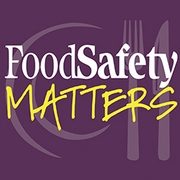
Home » Multimedia » Podcasts » Food Safety Matters » Ep. 42. Joe Stout: Sanitation and Hygienic Design in the Food Plant
Food Safety Matters
Food Safety Matters is a podcast for food safety professionals hosted by the Food Safety Magazine editorial team – the leading media brand in food safety for over 20 years. Each episode will feature a conversation with a food safety professional sharing their experiences and insights of the important job of safeguarding the world’s food supply.
Subscribe to this PodcastNew episodes are posted twice a month.



Ep. 190. Phil Kafarakis: Ensuring Food Safety for Food Away From Home
00:0000:0000:00
00:00

Hygiena: Optimizing Data for Improved Food Safety Risk Management and Compliance
00:0000:0000:00
00:00



Never miss the latest news and trends driving the food safety industry
eNewsletter | Website | eMagazine
JOIN TODAY!Copyright ©2025. All Rights Reserved BNP Media.
Design, CMS, Hosting & Web Development :: ePublishing